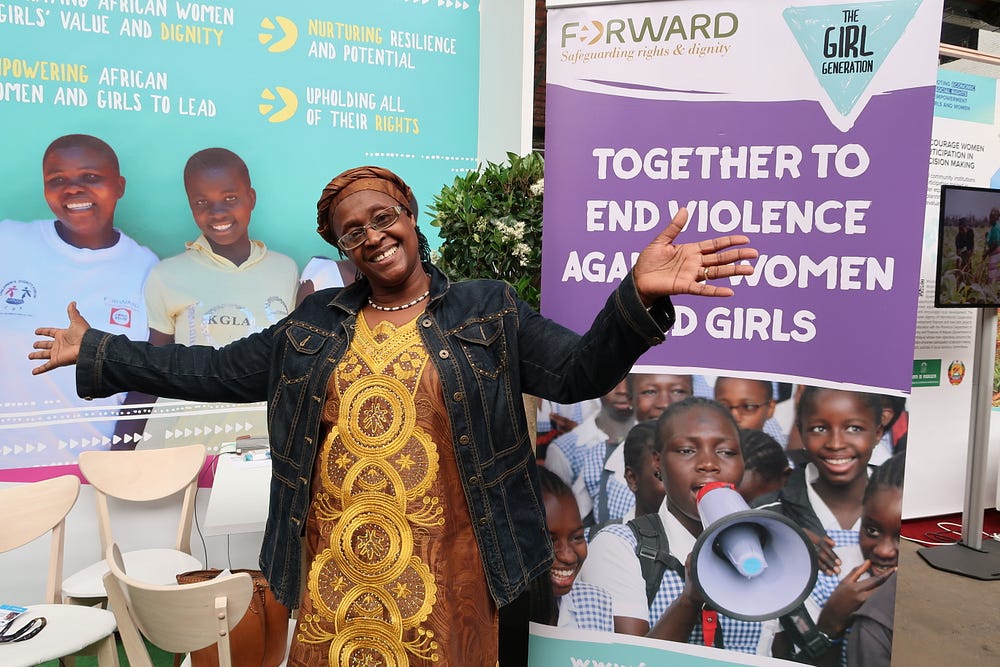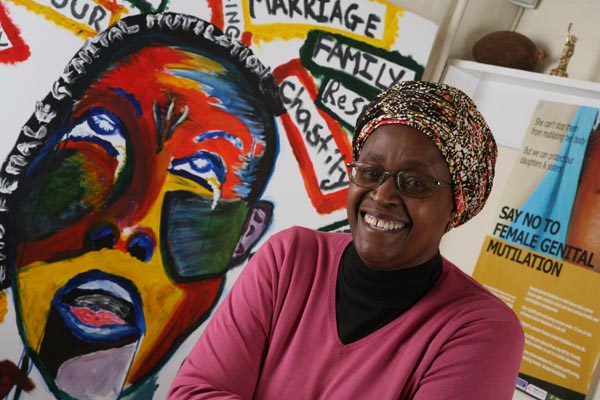10 minutes with Naana Otoo-Oyortey MBE
This blog post was written by Angela, from TuWezeshe Akina Dada leading partner, FORWARD.

I work at FORWARD, the lead partner of the TuWezeshe Akina Dada project. We have a unique culture — it’s loud, it’s passionate and it’s hardworking. It’s a culture that’s led from the top. Our Executive Director Naana is one of the most remarkable and poised women I’ve ever met — and her desk is just 5 steps away from mine. Barely a day goes by when we don’t hear Naana singing the praises of a young activist she’s just met or inquiring on how we can forge impactful relationships with dedicated organisations like ours. That’s the thing with Naana and with FORWARD, we’re all about uplifting and amplifying the voices of young African women.
To say the last few months have been busy would be an understatement. We’ve travelled over 9000 miles (thank you Distance Calculator) and trained more than 50 girls on being innovators of change in the campaign against sexual and gender-based violence. With one more country left on the map, I managed to secure ten minutes with Naana before the TuWezeshe fellowship went to Tanzania.
A: Four trainings down, one more to go why do you think there is such a need for the TuWezeshe fellowship?
N: I think the Tuwezeshe fellowship really meets a huge need within African communities in the UK and on the continent. Young women don’t always have access to safe spaces that give them an opportunity to reflect on themselves and the issues that adversely impact their capacity to make a difference. TuWezeshe provides a space where they can think deeply about the power within whilst simultaneously being supported by a sisterhood of like-minded women with whom they walk the journey. The skill building, access to mentors and the resources gained from the fellowship; these are what I believe they need on the road to becoming leaders.
A: You mentioned the power within; one of the sessions you led during the London training, Save The Drowning Babies, examined the role of different actors in development interventions. What would your advice be to a young activist who sees a need in her community but also feels overwhelmed by the many factors to consider?
N: I think the whole issue around that exercise was for us to realise that often, we’re picking up the pieces without necessarily looking at the root cause of the problem. Having said that, it is also important to understand the consequences and the impact of ALL actions. It’s not that one way of operating way is wrong. You do need to help people who are affected by a system but you also should really understand the powers that contribute towards the problem and to deconstruct the context. That session was also to illustrate that advocacy requires you to work with other people; one person may have to stand up to recognise that we have a problem but you must work with allies and networks. To my young activist: recognise that yes, you have a voice, but you need to strengthen that voice. Everything is possible with your determination and vision.
“I was really impressed by our conversations — the breadth of ideas, the innovation, the determination”
A: What has been the most memorable moment of the trainings ?
N: The most memorable part was getting our young women to deliver their pitches. For me, that epitomised everything that had been gained throughout the training. I was really impressed by our conversations during the speed mentoring sessions; the breadth of ideas, the innovation, the determination. The confident manner with which the fellows delivered their pitches on the day, was outstanding; really everyone was a star. This further emphasises the need to create spaces where we can refine these jewels and gems that are our young women. In the next five years, I am confident that we will see these women at the forefront of social change and development.
A: Tell me more about Tanzania, what are your expectations for the training there?
N: Tanzania will be very interesting and exciting. We’ve worked in Tanzania over the last 10 years and we’ve had elements of bringing young women from the communities to facilitate leadership training in different contexts. This training will focus on mobilising young women to lead their own projects. Having the training in both English and Swahili is going to very stimulating. For us as a Diaspora-led organisation, it is a model of good practice which we will review at the end of the year. I myself am very excited because the young women we have leading the project are very dynamic; they are motivated and very determined.

